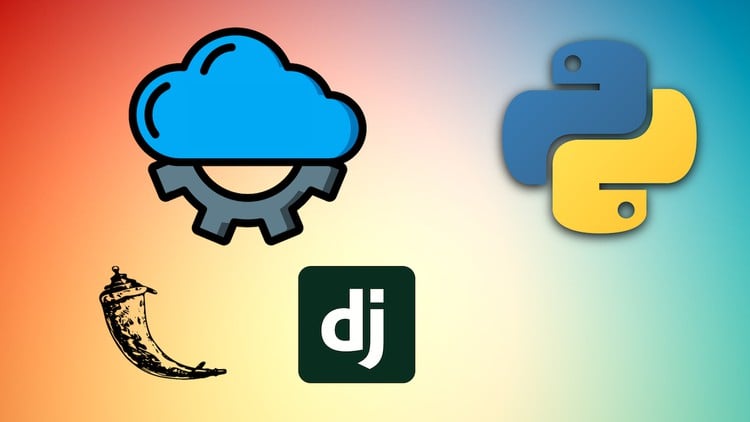
From Setup to RESTful Services: A Comprehensive Tutorial
⏱️ Length: 7.7 total hours
⭐ 4.37/5 rating
👥 10,920 students
🔄 October 2023 update
Add-On Information:
Note➛ Make sure your 𝐔𝐝𝐞𝐦𝐲 cart has only this course you're going to enroll it now, Remove all other courses from the 𝐔𝐝𝐞𝐦𝐲 cart before Enrolling!
- Course Overview
- Embark on a practical journey to master the art of building robust and efficient web services using Python’s most popular frameworks, Flask and Django. This comprehensive tutorial takes you from foundational setup to deploying fully functional RESTful APIs, enabling you to power modern web and mobile applications.
- Explore the distinctive strengths of both Flask, a lightweight micro-framework ideal for focused API development, and Django, a powerful full-stack framework perfect for scaling complex web projects, providing you with a versatile toolkit for any backend challenge.
- Understand the fundamental principles of RESTful architecture, including resource-based design, stateless communication, and standard HTTP methods, ensuring your APIs are well-structured, maintainable, and interoperable.
- Gain hands-on experience in architecting the backend logic that serves as the backbone for various applications, connecting data, users, and functionalities in a seamless and secure manner.
- This course is designed to equip you with the essential knowledge and practical skills required to confidently design, implement, and test high-performance APIs that meet industry standards.
- Requirements / Prerequisites
- A solid grasp of Python fundamentals, including variables, data types, control flow, functions, and basic object-oriented concepts, is essential to follow along effectively.
- Familiarity with using a command-line interface or terminal will be beneficial for managing project environments and running applications.
- A conceptual understanding of how the web works, including client-server interactions and the purpose of HTTP requests, will provide helpful context.
- No prior experience with Flask, Django, or building REST APIs is assumed, making this course accessible for Python developers looking to specialize in backend development.
- Access to a computer with an internet connection and a preferred code editor (e.g., VS Code, PyCharm) is necessary for the hands-on exercises.
- Skills Covered / Tools Used
- Master the principles of designing clean, scalable, and secure REST APIs, focusing on best practices for resource identification, uniform interfaces, and statelessness.
- Implement effective authentication and authorization mechanisms for your APIs, including popular strategies like JSON Web Tokens (JWT) and session-based authentication to secure access to your resources.
- Integrate and manage databases using Object-Relational Mappers (ORMs) in Django and Object-Document Mappers (ODMs) for NoSQL databases, ensuring efficient data persistence and retrieval for your applications.
- Learn to serialize and deserialize complex data structures into common API formats like JSON, facilitating seamless communication between your backend and frontend clients.
- Develop robust error handling strategies and data validation routines to create resilient APIs that gracefully manage unexpected inputs and server-side issues.
- Explore practical deployment strategies for your Flask and Django applications, understanding how to transition from local development to production environments.
- Gain insights into creating clear and comprehensive API documentation using tools like Swagger/OpenAPI specifications, making your APIs easily consumable by other developers.
- Acquire skills in testing your APIs using various methodologies, including unit tests and integration tests, to ensure functionality, reliability, and performance.
- Understand the basic concepts of containerization with Docker, laying the groundwork for deploying your APIs in isolated, reproducible environments.
- Work with virtual environments to manage project dependencies effectively, preventing conflicts and ensuring consistent development setups.
- Benefits / Outcomes
- You will be proficient in designing, developing, and implementing secure and scalable RESTful APIs using both Flask and Django, making you a versatile backend developer.
- Possess the foundational knowledge to build the backend infrastructure for a wide range of web, mobile, and IoT applications, significantly expanding your development capabilities.
- Gain a deep understanding of modern web service architecture, enabling you to contribute effectively to complex software projects and understand microservices patterns.
- Enhance your problem-solving skills specific to backend development, from data modeling and API design to security implementation and deployment challenges.
- Be well-prepared for entry-level to mid-level backend developer roles, with practical experience that stands out in the job market.
- Develop portfolio-ready projects that demonstrate your ability to create functional, well-structured APIs, showcasing your expertise to potential employers.
- Achieve the ability to independently develop the server-side logic for interactive web applications, making you a more complete and valuable developer.
- PROS
- Dual-Framework Mastery: Learning both Flask and Django provides a comprehensive understanding of Python web development, offering flexibility for different project scales and requirements.
- Hands-on Practicality: The course emphasizes practical application, moving swiftly from concepts to working code, which solidifies understanding and builds confidence.
- Modern Relevance: Covers essential and current practices in backend API development, ensuring the skills acquired are highly relevant in today’s tech landscape.
- Career Advancement: Equips learners with in-demand skills for backend developer roles, significantly boosting career prospects in web application development.
- Structured Progression: Follows a logical path from initial setup to advanced API concepts, making complex topics digestible and easy to follow.
- Up-to-Date Content: The October 2023 update ensures the course material is current with the latest versions and best practices of Flask, Django, and related tools.
- Popular Frameworks: Focuses on two widely adopted and well-supported Python web frameworks, benefiting from extensive community resources and documentation.
- CONS
- While comprehensive, the 7.7-hour duration provides a strong foundation but might require significant self-study and continued practice beyond the course material to achieve true mastery and in-depth expertise in all covered areas.
Learning Tracks: English,IT & Software,Other IT & Software
Found It Free? Share It Fast!